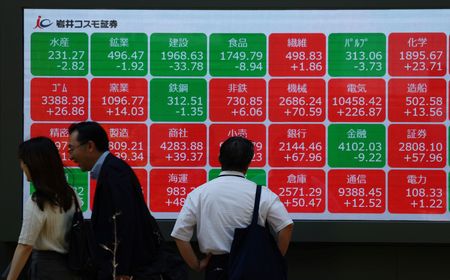By Trixie Yap and Stephanie Kelly
(Reuters) -Oil prices eased on Tuesday from a two-week high, weighed down by concerns about rising supplies and some caution over whether the pause in the U.S.-China trade war indicated a longer-term deal was likely.
Brent crude futures dropped 11 cents, or 0.2%, to $64.85 per barrel by 0510 GMT. U.S. West Texas Intermediate (WTI) crude fell 8 cents, or 0.1%, to $61.87.
Both benchmarks closed about 1.5% higher on Monday at their steepest settlements since April 28. The gains come during a turbulent time for global oil markets.
The U.S. and China agreed to slash steep tariffs for at least 90 days, sending Wall Street stocks, the U.S. dollar and crude prices sharply higher on Monday.
“While a thawing in trade tensions between China and the US is helpful, there’s still plenty of uncertainty over what happens in 90 days. This uncertainty could continue to generate headwinds for oil demand,” ING analysts said in an email to clients.
Underlying schisms that led to the dispute remain, including the U.S. trade deficit with China and U.S. President Donald Trump’s demand for more action from Beijing to combat the U.S. fentanyl crisis.
“There is still high uncertainty around the future US-China trade negotiations in the coming 90-day pause period and beyond, given the substantial differences between China and the US on some fundamental issues,” UBS Chief China Economist Wang Tao wrote in a client note.
Markets were eyeing rising supplies as a key driver for oil price weakness.
“Though demand has been a key concern for the oil market, supply increases from OPEC+ mean that the oil market will be well supplied through the remainder of the year,” ING analysts said, adding that how well supplied the market is will depend on whether OPEC+ sticks with plans for aggressive supply hikes in May and June.
The Organization of the Petroleum Exporting Countries (OPEC) has boosted oil output by more than previously expected since April, with May output likely up by 411,000 barrels per day.
However, oil price declines were capped by some signs that demand for refined fuel remains strong.
“Despite the deteriorating outlook for crude demand, positive signals from the fuel markets cannot be overlooked. Although international crude prices have declined by 22% since their peak on January 15, both refined product prices and refining margins have remained stable,” JP Morgan analysts said in a note.
Reduced refining capacity – mostly in the U.S. and Europe – is tightening gasoline and diesel balances, increasing reliance on imports and raising susceptibility to price spikes during maintenance and unplanned outages, they added.
Complex refining margins in Singapore have nearly doubled in May, averaging at $6.60 a barrel this month, up from $3.65 in April, LSEG pricing data showed.
(Reporting by Trixie Yap and Stephanie Kelly; Editing by Jacqueline Wong and Jamie Freed)










